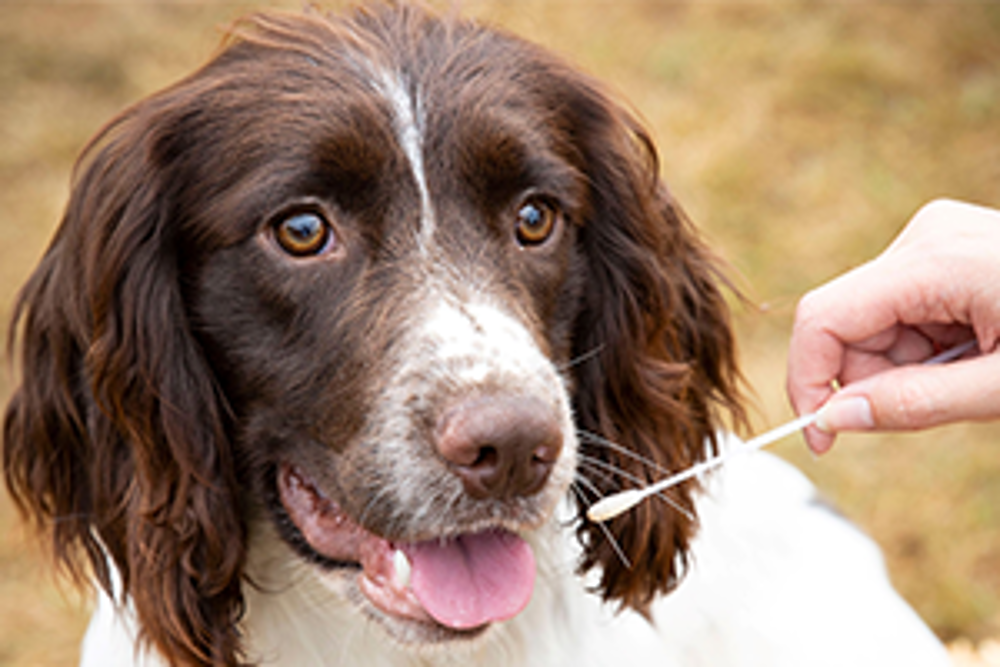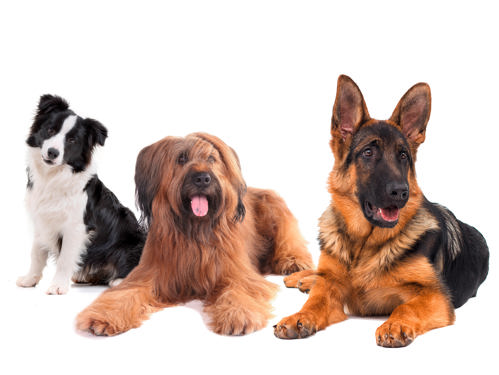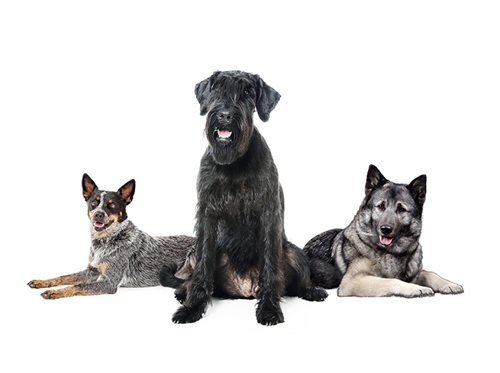
Understanding your dog’s genetics equips you to plan for their future, potentially averting costly vet bills and supporting their health proactively. For breeders, knowing your dog’s genetics reduces the risk of producing puppies with inherited conditions, guiding your choice of mating partners.
Test your dog with The Kennel Club's DNA Testing Services
Our DNA Testing Services offers a simple and cost-effective way to DNA test your dog for the priority DNA tests for their breed.
Which DNA tests are recommended and available for my dog’s breed
Find out which health tests and screening schemes are relevant to your breed on our Breeds A to Z.
What are 'Breed specific packages'?
With our breed-specific packages, you can check your dog for a number of different genetic mutations all at the same time, making health testing easy and saving you from organising individual tests from several different laboratories.
Individual DNA tests
We offer wide selection of individual DNA tests. Ideal for when a full breed-specific package isn't necessary, these tests let you select exactly what tests your dog requires.
What is a DNA Profile?
A DNA profile gives you a unique genetic code for your dog - a little like your dog’s very own genetic fingerprint. This allows your dog’s DNA to be accurately identified and can be used for parentage analysis. Unlike other types of identification, a DNA profile stays the same throughout your dog’s entire life and cannot be lost, manipulated or destroyed.
The Kennel Club’s DNA Testing Services offer the industry’s gold-standard SNP DNA profile.
Find out more about our profiling service here.
How to DNA test your dog
Our DNA testing service and most others require you to take a simple mouth swab from inside your dog's mouth (usually from their cheek). Some laboratories and DNA tests may require a qualified person to take a blood sample from your dog, but these are rare.
Submitting your results
When you use The Kennel Club’s DNA Testing Services, your results are automatically uploaded to your dog’s record, saving you the hassle.
How to submit DNA test results from other laboratories
To submit results from another laboratory, please email our health team on Health (The Kennel Club) with a copy of the result certificate.
Note, results must be of a recognised DNA test and from an approved laboratory for us to record them. Some laboratories submit results directly to our database, but we recommend confirming this with them. Below, you can find a list of recognised DNA tests and approved laboratories.
What we require on the results certificate
We require at least two forms of identification on the result certificate. These must include the dog's microchip or tattoo number along with either the dog's registered name or their registered number. We do not accept DNA test result certificates that are missing these details.
Which DNA tests do The Kennel Club record?
| DNA test | Mode of inheritance | Breeds |
|---|---|---|
| AI/FEH (Amelogenesis Imperfecta/Familial Enamel Hypoplasia) |
Autosomal recessive | Japanese Akita Inu |
| Adult-onset neuropathy (AON) | Autosomal recessive |
Cocker Spaniel |
| AMPN (Alaskan Malamute polyneuropathy) | Autosomal recessive |
Alaskan Malamute |
| AMS (Acral mutilation syndrome) | Autosomal recessive |
Cocker Spaniel |
| BBS2-PRA (Progressive retinal atrophy) |
Autosomal recessive |
Shetland Sheepdog |
| CA (Cerebellar ataxia) | Autosomal recessive (linkage test) |
Italian Spinone |
| CC/DE (Curly coat/Dry eye) | Autosomal recessive |
Cavalier King Charles Spaniel |
| CDSL (Chondrodysplasia) | Autosomal recessive |
Norwegian Elkhound |
| CEA/CH (Collie eye anomaly/Choroidal hypoplasia) | Autosomal recessive |
Australian Shepherd |
| CHG (Congenital hypothyroidism with goiter) | Autosomal recessive |
Spanish Water Dog |
| CLAD (Canine leucocyte adhesion deficiency) | Autosomal recessive |
Irish Red and White Setter |
| CNGA1-PRA (Progressive retinal atrophy) |
Autosomal recessive |
Shetland Sheepdog |
| CNM (Centronuclear myopathy) | Autosomal recessive |
Labrador Retriever |
| COMMD1 (Copper toxicosis) | Autosomal recessive |
Bedlington Terrier |
| Cone degeneration | Autosomal recessive |
Alaskan Malamute |
| Copper toxicosis (COMMD1) | Autosomal recessive (linkage test) |
Bedlington Terrier |
| CSNB (Congenital stationary night blindness) | Autosomal recessive |
Briard |
| CU (Cystinuria) | Autosomal recessive |
Newfoundland |
| DAMS (Dyserythropoietic anemia and myopathy syndrome) | Autosomal recessive | English Springer Spaniel |
| DCM (Dilated cardiomyopathy) | Autosomal recessive |
Giant Schnauzer |
| DE (Degenerative encephalopathy) | Autosomal recessive | Nova Scotia Duck Tolling Retriever |
| DINGS2 |
Autosomal recessive | Dobermann |
| DM (Degenerative myelopathy) | Autosomal recessive with incomplete penetrance (risk based DNA test) |
Chesapeake Bay Retriever |
| DP-LHX3 (pituitary dwarfism) |
Autosomal recessive |
Tibetan Terrier |
| EF (Episodic falling) | Autosomal recessive |
Cavalier King Charles Spaniel |
| EIC (Exercise-induced collapse) | Autosomal recessive for most breeds but incomplete penetrance for Curly Coated Retrievers |
Clumber Spaniel |
| ENM (Hereditary necrotising myelopathy) | Autosomal recessive | Kooikerhondje |
| FN (Familial nephropathy) | Autosomal recessive |
Cocker Spaniel |
| EOPRA (early oneset progressive retinal atrophy) | Autsomal recessive | Portuguese Water Dog |
| Fuco. (Fucosidosis) | Autosomal recessive |
English Springer Spaniel |
| FVIID (Factor VII deficiency) | Autosomal recessive |
Beagle |
| Glanzmann's Thrombasthenia | Autosomal recessive |
Otterhound |
| GM1 (Gangliosidosis) | Autosomal recessive |
Portuguese Water Dog |
| GM1-2 (Gangliosidosis) | Autosomal recessive |
Japanese Shiba Inu |
| GM2-2 - (Gangliosidosis) - type II (Sandhoff) |
Autosomal recessive |
Japanese Shiba Inu |
| GN (Greyhound neuropathy) | Autosomal recessive |
Greyhound |
| Gonio (Severe goniodysgenesis and glaucoma risk) | Autosomal recessive |
Border Collie |
| GR-PRA1 (Golden Retriever progressive retinal atrophy 1) | Autosomal recessive |
Golden Retriever |
| GR-PRA2 (Golden Retriever progressive retinal atrophy 2) | Autosomal recessive |
Golden Retriever |
| GSDII (Glycogen storage disease type II (Pompe's disease)) | Autosomal recessive |
Finnish Lapphund |
| HC-HSF4 (Hereditary cataracts) | Autosomal recessive/ Autosomal dominant |
Australian Shepherd |
| HCA (Hereditary cerebellar ataxia) | Autosomal recessive |
Norwegian Buhund |
| HFH (Hereditary footpad hyperkeratosis) | Autosomal recessive | Irish Terrier |
| HNPK (Hereditary nasal parakeratosis) | Autosomal recessive |
Labrador Retriever |
| HUU (Hyperuricosuria) | Autosomal recessive |
Bulldog |
| ICT-A (Ichthyosis) | Autosomal recessive |
Golden Retriever |
| IGS (Imerslun-Gräsbeck syndrome/Cobalamin malabsorption) | Autosomal recessive |
Beagle |
| IMGD (Inherited myopathy of Great Danes) | Autosomal recessive |
Great Dane |
| JADD (Juvenile Addison’s disease) | Autosomal recessive with incomplete penetrance (risk based DNA test) | Nova Scotia Duck Tolling Retriever |
| JDCM (Juvenile dilated cardiomyopathy) | Autosomal recessive |
English Toy Terrier (Black & Tan) Manchester Terrier |
| JE (Juvenile epilepsy) | Autosomal recessive |
Lagotto Romagnolo |
| JLPP (Juvenile laryngeal paralysis & Polyneuropathy) | Autosomal recessive |
Rottweiler |
| JME (Juvenile myoclonic epilepsy) | Autosomal recessive |
Rhodesian Ridgeback |
| L-2HGA (L-2-hydroxyglutaric aciduria) | Autosomal recessive |
Staffordshire Bull Terrier |
| Lafora's disease | Autosomal recessive | Basset Hound Beagle Dachshund (Miniature Wire Haired) |
| LEMP (Leukoencephalomyelopathy) | Autosomal recessive with incomplete penetrance |
Leonberger |
| LEMP-2 (Leukoencephalomyelopathy) | Autosomal recessive |
Rottweiler |
| LOA (Late onset ataxia) | Autosomal recessive |
Jack Russell Terrier |
| LPN1 (Leonberger polyneuropathy) | Autosomal recessive |
Leonberger |
| LPN2 (Leonberger polyneuropathy) | Autosomal dominant |
Leonberger |
| LPPN3 (Laryngeal paralysis and polyneuropathy) | Autosomal recessive |
Leonberger |
| LSD (Lysosomal storage disease) | Autosomal recessive |
Lagotto Romagnolo |
| MAC (Mycobacterium avium complex) | Autosomal recessive | Miniature Schnauzer |
| MCD (Macular corneal dystrophy) |
Autosomal recessive |
Labrador Retriever |
| MDR1 (Multiple drug sensitivity) | Autosomal recessive |
Australian Shepherd |
| MLS (Musladin-Leuke syndrome) | Autosomal recessive |
Beagle |
| MPSIIIB (Mucopolysaccharidosis Type IIIB) | Autosomal recessive |
Schipperke |
| NAD (Neuroaxonal dystrophy) | Autosomal recessive |
Papillon |
| NCCD (Neonatal cerebellar cortical degeneration) | Autosomal recessive |
Beagle |
| NCL5 (Neuronal ceroid lipofuscinosis) | Autosomal recessive |
Border Collie |
| NCL8 (Neuronal ceroid lipofuscinosis) | Autosomal recessive | English Setter |
| NCL12 (Neuronal ceroid lipofuscinosis) | Autosomal recessive |
Tibetan Terrier |
| OC (Osteochondrodysplasia) | Autosomal recessive |
Miniature Poodle |
| Pap-PRA1 (Progressive retinal atrophy - Papillons) | Autosomal recessive |
Papillon |
| PCD (Primary ciliary syskinesia) | Autosomal recessive |
Old English Sheepdog |
| PDE (Pug Dog Encephalitis) | Autosomal recessive with incomplete penetrance (Risk Based DNA test) | Pug |
| PDP-1 (Pyruvate dehydrogenase phosphate 1 deficiency) | Autosomal recessive |
Clumber Spaniel |
| PFK (Phosphofructokinase deficiency) | Autosomal recessive |
American Cocker |
| PHPT (Primary hyperparathyroidism | Autosomal recessive |
Keeshond |
| PLL (Primary lens luxation) | Autosomal recessive |
Australian Cattle Dog |
| POAG - (Primary open angle glaucoma) | Autosomal recessive |
Basset Hound |
| POAG/PLL (Primary open angle glaucoma / Primary lens luxation) | Autosomal recessive |
Shar Pei |
| POAG-4 (Primary open angle glaucoma) | Autosomal recessive |
Basset Fauve de Bretagne |
| PRA (cord1) (Progressive retinal atrophy) | Autosomal recessive |
Dachshund (Miniature Long Haired) |
| PRA (crd3) (Progressive retinal atrophy) | Autosomal recessive |
Glen of Imaal Terrier |
| PRA (rcd1) (Progressive retinal atrophy) | Autosomal recessive |
Irish Setter |
| PRA (rcd2) (Progressive retinal atrophy) | Autosomal recessive |
Rough Collie |
| PRA (rcd3) (Progressive retinal atrophy) | Autosomal recessive |
Welsh Cardigan Corgi |
| PRA (rcd4) (Progressive retinal atrophy) | Autosomal recessive |
English Setter |
| PRA3 (Progressive retinal atrophy) | Autosomal recessive |
Tibetan Spaniel |
| PRA4 (Progressive retinal atrophy) | Autosomal recessive |
Lhasa Apso |
| PRA5 (Progressive retinal atrophy) | Autosomal recessive |
Giant Schnauzer |
| prcd-PRA (Progressive rod cone degeneration - Progressive retinal atrophy) | Autosomal recessive |
American Cocker Spaniel |
| Raine's synd | Autosomal recessive |
Border Collie |
| Retinopathy | Autosomal recessive |
Swedish Vallhund |
| Sal-NCL (Saluki Neuronal ceroid lipofuscinosis) | Autosomal recessive |
Saluki |
| SCA (Spinocerebellar ataxia) | Autosomal recessive |
Jack Russell Terrier |
| SD2 (Skeletal dysplasia 2) | Autosomal recessive |
Labrador Retriever |
| SLEM (Spongiform leuco-encephalo-myelopathy) | Autosomal recessive | Border Terrier |
| SN (Sensory neuropathy) | Autosomal recessive |
Border Collie |
| STGD (Stargardt disease) |
Autosomal recessive |
Labrador Retriever |
| T-box (bob tail) |
Autosomal dominant | Schipperke |
| TNS (Trapped neutrophil syndrome) | Autosomal recessive |
Border Collie |
| vWD type I (von Willebrand disease) | Autosomal recessive |
Dobermann |
| vWD type II (von Willebrand disease) | Autosomal recessive |
German Wirehaired Pointer |
| vWD type III (von Willebrand disease) | Autosomal recessive |
Kooikerhondje |
|
|
Autosomal recessive |
English Toy Terrier (Black & Tan) Manchester Terrier |
| XLHN (X-linked hereditary nephritis | X-linked | Samoyed |
| XLPRA (X-linked progressive retinal atrophy type 1) | X-linked | Samoyed |
Breeding advice and understanding what your dog’s results mean
Click for more details
If you're thinking of breeding from your dog and want to know how to avoid producing puppies affected by the condition you've tested for, or if you just want to understand what you're dog's DNA test results mean, you can find out more on our breeding advice and DNA test results page.
Find a dog's DNA test results
Our Health Test Results Finder can help you find the results for any dog on our records that has been screened for the DNA tests and screening schemes that we record.
Lists of dogs with clear, carrier or affected status can be found under the health section of each breeds entry on our website in Breeds A to Z section.
Collective results for activity dogs
View breed-specific DNA test results statistics
Statistics on the number of dogs scored by a DNA test and their results can be accessed in our DNA testing breed-specific information.
Laboratories we record and publish results from
Click for more details
We have a criteria that we request DNA testing laboratories meet to enable us to record their results, helping to maintain and protect the integrity of results that appear on a dog’s record.
We strongly advise that customers ensure their chosen laboratory is included on our list below if they wish for us to record and publish the results. Results from laboratories not included on this list will not be recorded.
- The Kennel Club DNA Testing Services (UK)
- Animal DNA Diagnostics (UK)
- Canine Genetic Testing (UK)
- Embark (USA)
- Genomia (Czech Republic)
- Laboklin
- MyDogDNA/Wisdom Panel (Finland)
- Orivet (Australia)
- Paw Print Genetics/Canine Health Check/Neogen (UK & USA)
- University of California - Davis Veterinary Genetics Laboratory (USA)
- VHLGenetics/Combibreed (Holland)
- Orthopaedic Foundation for Animals
- AnimalLabs (Croatia) (verification in progress, subject to change)
- Animal Genetics (UK) (verification in progress, subject to change)
- University of Utrecht (Holland) (verification in progress, subject to change)
- University of Missouri
Health Testing Agents
Health Testing Agents are not laboratories but offer DNA testing services and events. Find a list of Health Testing Agents here:
- Pathways Genetics
If you’re interested in becoming a Health Testing Agent and wish to be added to our list of Health Testing Agents, please contact The Kennel Club’s health team on Health (The Kennel Club) to find out more.
How we recognise new DNA tests
Find out how
We’re happy to consider a breed club's request to add a new DNA test to our list of recommended tests or tests available.
We would normally need a formal request from the relevant breed health co-ordinator, or a majority request from the breed clubs. In most cases, the test would need to be run by a laboratory already recognised by us. All DNA tests must be able to record a definitive result for an individual dog, and must be based on robust science. We continue to work alongside breed clubs, breed health co-ordinators and canine health professionals in a collaborative effort to improve the health of pedigree dogs.
Learn more about DNA testing with our free webinar
If you'd like to learn more about how genetic conditions are inherited, what DNA is, and how genes work within a dog's body, we invite you to view our free webinar on the science behind DNA testing.
You can also read our guide on understanding canine genetics or visit The Kennel Club Academy.
For further details about our DNA testing service, please contact our Health team on Health (The Kennel Club)






